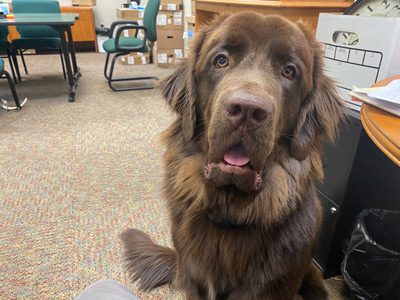Are you an animal lover?

Our therapy dog, Nala
Maybe you have a beloved pet or like to volunteer at your local shelter or take every opportunity to get out into nature where you can spot a whole range of creatures big and small.
If that sounds like you, odds are you already know that interactions with animals can improve our daily lives. This is especially true if you have a pet who offers up unconditional love and loyalty. Whether they sit in your lap and let you pet them or swim around a tank in lazy circles or chirp brightly from their perch, your bond with your pet likely increases your overall feeling of well-being.
Because of this ability for humans and their favorite animal companions to bond in serious and lasting ways, having a pet can be helpful for people in recovery for a substance use disorder or as a support for mental health.
But bringing an animal into your home isn’t the only way to forge a beneficial relationship. Many animals—including dogs, birds, and horses—can be trained to serve in a therapeutic setting. Animal therapy can be a powerful tool to support both mental and physical health.
How does it work? Let’s take a closer look.
Sit, Stay, and…Be Therapeutic?
It is reasonable to wonder how an animal can play a therapeutic role. After all, they can’t enroll in a therapist training program, right?
Well, not exactly. But there are, in fact, rigorous training programs for animals and their handlers who hope to have a positive impact in people’s lives. The animal and the handler have to acquire a range of certifications before they can go to work. That process includes:
- An intensive instructional course for the handler that focuses on appropriate and helpful interactions and the details of various therapies
- A check of the animal’s immunization records and a complete physical exam to ensure the animal is healthy
- A temperament testing process to ensure the animal will behave appropriately with the handler and in the presence of the people they are working to help
- An obedience course for the pair to ensure the handler and the animal have a shared understanding of expectations, behaviors, and cues
- All therapeutic work is done under the guidance of a doctor to ensure the treatment is appropriate and effective
If your doctor recommends animal therapy, you can be assured that the animal in question has been trained and tested (as has their handler) to ensure that they are able to provide real benefits to you.
Therapy Animals & Mental Health
You might associate spending time with animals with physical activity, and it is certainly true that therapy animals can be helpful for people recovering from an illness or injury or who are dealing with ongoing pain.
But therapy animals can also be extremely beneficial in improving an individual’s mental health. Animal therapy has been shown to:
- Increase a person’s sense that they have a strong system of social support to help them cope with stress
- Provide support in times of crisis and/or contribute to trauma recovery
- Reduce anxiety levels and symptoms of depression
- Serve as a key component of a formal treatment plan for mental health
These boosts to a person’s mental health are potentially beneficial in a wide variety of circumstances—including helping someone who is in recovery for a substance use disorder.
Ongoing sobriety and good mental health are intimately linked, and so the benefits derived from animal therapy can be powerful, indeed.
Sharing the Love & Benefits With Many People
Generally, when we think of the connection between an animal and a human, we imagine a one-to-one relationship. But if a dog is a therapy animal, they are comparable to a therapist or doctor in the sense that they see a range of people and help with a variety of issues. You’ll likely have a regular appointment with your therapy animal just like you do with your physician or therapist.
Not Everyone Is Comfortable With Therapy Animals
There are a number of reasons you may not benefit from working with a therapy animal. For example, you may be allergic to the animal, which will make you feel miserable rather than better. Or you might have a longstanding fear of animals or associate a specific kind of animal with a traumatic experience in your past.
A good rule of thumb is that if interacting with an animal increases—rather than decreases—feelings of stress, it probably is not the right therapeutic option for you.
We Have a Therapy Dog on Our Team
The staff of Wooded Glen Recovery Center is delighted to welcome Nala to our team. Nala will be available to work with clients who come to Wooded Glen for help with a substance use disorder, mental health disorders, or both.
That said, we remain fully committed to personalized treatment plans at Wooded Glen Recovery Center. So, if a therapy animal is not going to be beneficial to you (for whatever reason), Nala won’t be part of your treatment plan. But if it seems likely you will benefit, we’re pleased to have this additional treatment option.


